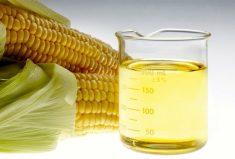The federal government has served a year’s notice on partially hydrogenated oils (PHOs) as ingredients in foods sold in Canada.
Health Minister Ginette Petitpas Taylor announced Friday that PHOs will be added to Canada’s List of Contaminants and Other Adulterating Substances effective Sept. 15, 2018, giving Canadian food processors and importers “enough time to find suitable alternatives.”
PHOs are formed through hydrogenation, in which hydrogen is added to vegetable oil, allowing the liquid oil to form a solid fat at room temperature. Their shelf life has made them a preferred source of fats in preparing certain commercial baked goods, snack foods, fried foods, refrigerated doughs and shortenings.
Read Also

Senft to step down as CEO of Seeds Canada
Barry Senft, the founding CEO of the five-year-old Seeds Canada organization is stepping down as of January 2026.
PHOs, which Health Canada described as the main source of industrially produced trans fats, will be banned from use in all food sold in Canada, including domestically produced and imported products and foods and those prepared and served in restaurants and food service establishments.
Trans fats, Health Canada said, raise “bad” (low-density lipoprotein) cholesterol and lower “good” (high-density lipoprotein) cholesterol levels in the blood. Outside of PHOs, trans fats also occur naturally at low levels in other oils and some meat and dairy products.
“By banning PHOs, Health Canada will reduce trans fats in the Canadian food supply to the lowest level possible, which will help reduce Canadians’ risk of heart disease,” the department said, noting heart disease led to about 50,000 deaths in 2012.
“Eliminating the main source of industrially produced trans fat from the food supply is a major accomplishment and a strong new measure that will help to protect the health of Canadians,” Petitpas Taylor said in Friday’s release.
“Trans fats are still high in baked goods and other foods often consumed by children and other vulnerable populations,” Yves Savoie, CEO of the Heart and Stroke Foundation of Canada, said in the same release. “This will reduce the number of heart attacks in Canada and save lives.”
The government’s PHO ban follows consultations on the proposal, launched in November last year.
“Data published over the last decade suggest that initiatives to decrease the trans fat consumption of Canadians have been highly effective,” the government said at the time, noting a 2011 survey of about 10,000 prepackaged and restaurant foods on the Canadian market which found 97 per cent met the voluntary targets for trans fat.
Food processing firms have in many cases already moved away from PHOs to alternatives such as high-oleic canola oil, fully hydrogenated oils and naturally solid fats such as palm oil.
However, Health Canada said last November, “as of 2011 there were still certain food categories that continued to have large proportions of foods not meeting the trans fat targets.”
Among those, the department said, were dairy-free cheeses, frosting, coffee whiteners, lard and shortening, shortbread cookies and refrigerated dough, as well as restaurant biscuits, scones and cookies.
The department’s 2011 risk assessment also showed “some subpopulations” at risk for higher trans fat intakes including children and teens, Canadians living in remote areas, “price-sensitive” consumers and those who regularly consumed foods remaining high in trans fat.
Canada’s move also follows similar action in the U.S., where the Food and Drug Administration in 2015 ruled PHOs are not GRAS (Generally Recognized as Safe) and can no longer be added to food effective June 18, 2018.
“In this case, it has become clear that what’s good for extending shelf life is not equally good for extending human life,” Susan Mayne, director of the FDA’s Center for Food Safety and Applied Nutrition, said at the time. –– AGCanada.com Network















